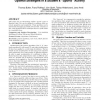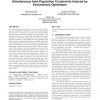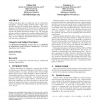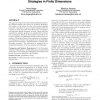103
Voted
GECCO
2006
Springer
15 years 5 months ago
2006
Springer
Recently, studies with the XCS classifier system on Boolean functions have shown that in certain types of functions simple crossover operators can lead to disruption and, conseque...
111
click to vote
GECCO
2006
Springer
15 years 5 months ago
2006
Springer
The learning classifier system XCS is an iterative rulelearning system that evolves rule structures based on gradient-based prediction and rule quality estimates. Besides classifi...
GECCO
2006
Springer
15 years 5 months ago
2006
Springer
This paper uses an entertaining student "sports" game to illustrate that GAs can be adapted to problems with uncertain properties and complexity. These problems can be s...
104
click to vote
GECCO
2006
Springer
15 years 5 months ago
2006
Springer
The use of genotypic populations is necessary for adaptation in Evolutionary Algorithms. We use a technique called form-invariant commutation to study the immediate effect of evol...
123
click to vote
GECCO
2006
Springer
15 years 5 months ago
2006
Springer
Niching techniques play an important role in evolutionary algorithms. Existing niching methods often require userspecified parameters, limiting their usefulness. This paper propos...
106
Voted
GECCO
2006
Springer
15 years 5 months ago
2006
Springer
A spanning tree of a graph such that each vertex in the tree has degree at most d is called a degree-constrained spanning tree. The problem of finding the degree-constrained spann...
96
Voted
GECCO
2006
Springer
15 years 5 months ago
2006
Springer
This paper presents an algorithm for solving a number of generalized graph coloring problems. Specifically, it gives an agent-based algorithm for the Bandwidth Coloring problem. U...
GECCO
2006
Springer
15 years 5 months ago
2006
Springer
Given the prominence of elite archiving in contemporary multiobjective optimisation research and the limitations inherent in bounded population sizes, it is unusual that the vast ...
100
click to vote
GECCO
2006
Springer
15 years 5 months ago
2006
Springer
This paper investigates the limits of the predictions based on the classical progress rate theory for Evolution Strategies. We explain on the sphere function why positive progress...
114
Voted
GECCO
2006
Springer
15 years 5 months ago
2006
Springer
When a considerable number of mutations have no effects on fitness values, the fitness landscape is said neutral. In order to study the interplay between neutrality, which exists ...




